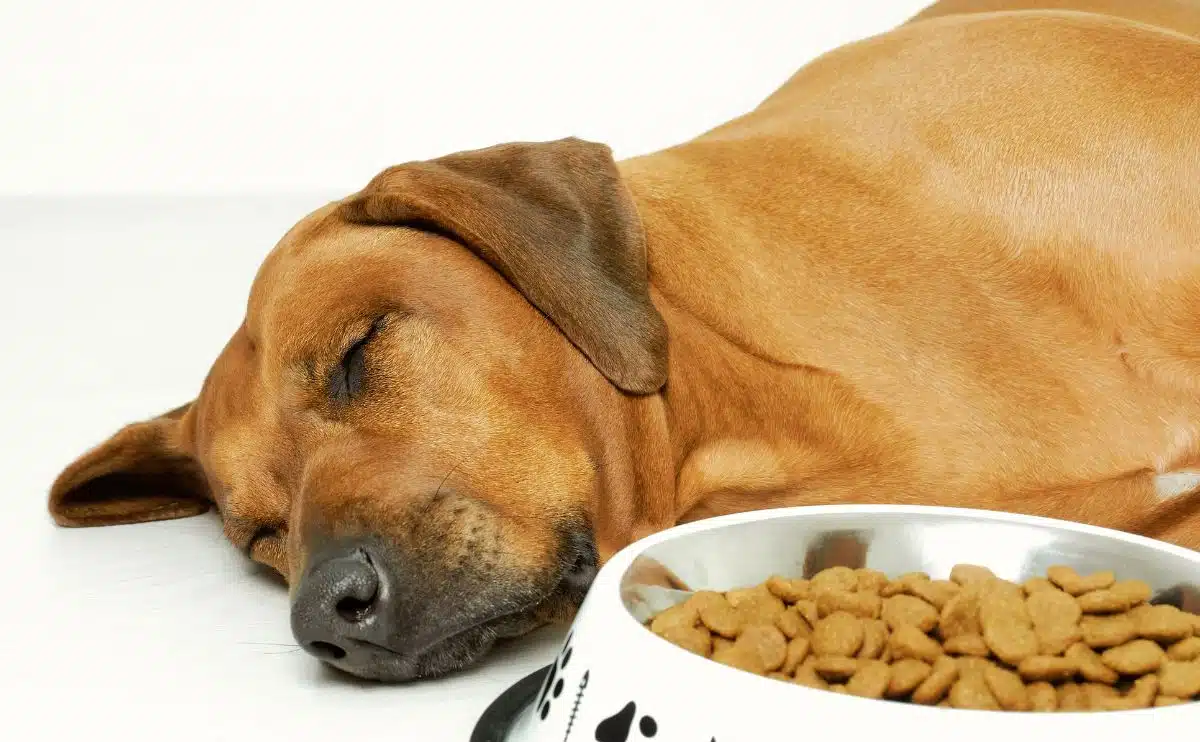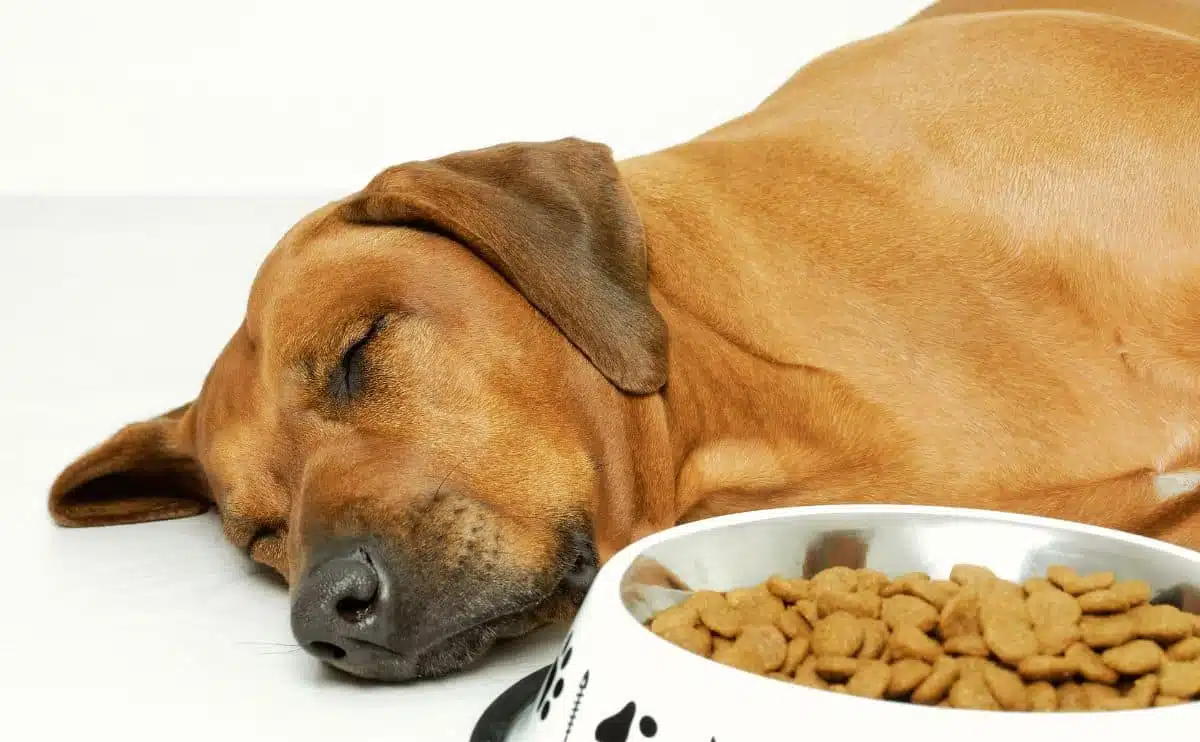
To keep the lights on, we receive affiliate commissions via some of our links. Our review process.

It’s never nice when your canine companion turns their nose up at their food. As a pet parent, it’s natural to assume there’s something really wrong and phone the vet or compile a buffet of food favorites to tempt them. But what does it mean if your dog is not eating? What are the possible causes, and what should you do?
Loss Of Appetite In Dogs
Contents
Loss of appetite in dogs is a very common symptom and can refer to your dog being a little more picky than usual or losing their appetite completely. In some instances, an apparent loss of appetite isn’t a symptom of any medical problem, just fussiness or a dislike of the current dog food offering. However, appetite loss may also signal a wide range of health problems.
Why Is My Dog Not Eating? 5 Possible Reasons
If your dog won’t eat, it doesn’t necessarily mean they’re unwell. Ask yourself whether they’re behaving normally or showing any other symptoms of being poorly and try offering them something else (that’s pet safe!) to eat. If they’re very keen to eat the new food, and they’re wagging their tail and raring to go for a walk or play, there’s unlikely to be too much wrong with them. However, not eating can be a sign of the following types of health problems:
Nausea
Just like humans, if dogs feel sick, they usually don’t feel like eating. Of course, if your dog has been vomiting, you’ll probably make the association that they’re feeling sick and don’t want to eat, but other signs of nausea include dribbling excessively and retching or gagging. Nausea can be caused by many health conditions, including stomach upset, gastroenteritis, motion sickness, toxin ingestion, pancreatitis, and liver or kidney disease, and some medications can help if you speak to your veterinarian.
Fever
If your dog has a high temperature, they might not have much of an appetite. So, that means if their body is fighting a viral or bacterial infection or has widespread inflammation, they’re likely to go off their food. Often, there’ll be other symptoms as well as a poor appetite, like a cough, blood in the urine, diarrhea, or a discharging abscess, although some infections might not be so obvious.
Mouth Pain
If your dog has a fractured or infected tooth, gingivitis, ulcers, or a growth in their mouth, they might not want to eat because it causes them pain. As well as a reduced appetite, you might see them dribbling, bleeding from their mouth, or rubbing their face. If the cause is infection, they might also have halitosis (bad breath).
General Pain
It’s not just oral pain that could make your furry friend think twice about eating. Abdominal pain or even severe pain elsewhere could put them off their dinner. Look out for other symptoms associated with pain, like limping, groaning, whining, praying position, licking, or poor mobility.
Trouble Eating Or Swallowing
It could be that your dog wants to eat, but they can’t. Problems with the teeth, mouth, or jaw could make it more difficult for them to pick up or chew food, and issues with the throat or esophagus could make it hard for them to swallow. If you notice they’re struggling to eat, dribbling, regurgitating, or dropping food, speak to your veterinarian.
What Should I Do If My Dog Refuses To Eat
If your dog refuses to eat, that doesn’t necessarily mean anything serious is going on. Look out for other symptoms of them being unwell or in pain, and try offering them a different dog food or a couple of dog treats.
Not Eating Food, But Eats Treats
If your dog is well in themselves, showing no other symptoms and wolfing down treats with no trouble, they might just be fussy or hoping for something tastier. Try not to cave every time they turn their nose up at their food, though, as this is likely to encourage them to be fussy, and you might end up changing their dog food every week.
Choose a dog food that contains everything they need, and they seem to like and try to stick to that. It’s also a good idea to pick their food bowl up after half an hour to prevent grazing, then wait until the next mealtime to feed them again. This will ensure that they’re hungrier for their next meal.
Our Personal Experience
“My dog has experienced food allergies so we’ve tried several different brands over the years. We finally found one that doesn’t upset his tummy, but he doesn’t seem to want to eat it unless I sprinkle crushed up treats on top of it and then he gobbles it right up!”
– Sadie Cornelius, Cavalier Dog Parent
Dog Not Eating, But Drinking Water
Your dog can go longer without food than they can without water. If your dog isn’t eating or drinking anything at all for twenty-four hours, you should make an appointment to take them to the vet clinic. On the other hand, if they are still drinking and seem well in themselves, you could wait a little longer to see if they improve. You should never let your dog go longer than 48 hours without eating. You should take them to visit a vet urgently.
Not Eating & Throwing Up
If your dog is vomiting, they’re likely to become dehydrated and weak more quickly. Therefore, you should get them checked by a vet sooner rather than later, especially if they can’t keep water down or they’re acting unwell themselves.
Won’t Eat Or Drink
If your dog isn’t eating or drinking and isn’t interested in moving around, this requires an urgent vet visit. It could mean that your poor pooch has become dehydrated and is unable to stand because they’re so weak, or it could be that pain or another underlying condition is causing them to be very lethargic. A veterinarian will be able to examine them, do any testing that’s required, and prescribe medication to make them feel better.
Can Pet Insurance Help?
If your dog isn’t eating, there’s a strong chance they will need to see a vet. An appointment for this can easily be a couple of hundred dollars or more, depending on the tests the vet runs and what is discovered. Pet insurance can help cover the cost of this appointment, plus many other illnesses and conditions.
Other Ways To Entice Dogs To Eat
It’s normal to be worried if your dog isn’t eating. However, it’s important to remember that they might just be being picky with their food. Having read this article, hopefully, you’ll know how to tell the difference between a picky pet and one who needs a vet. No matter what you feed your pup, make sure they don’t eat these human foods. And keep an eye out for other symptoms like blood in their stool or throwing up.